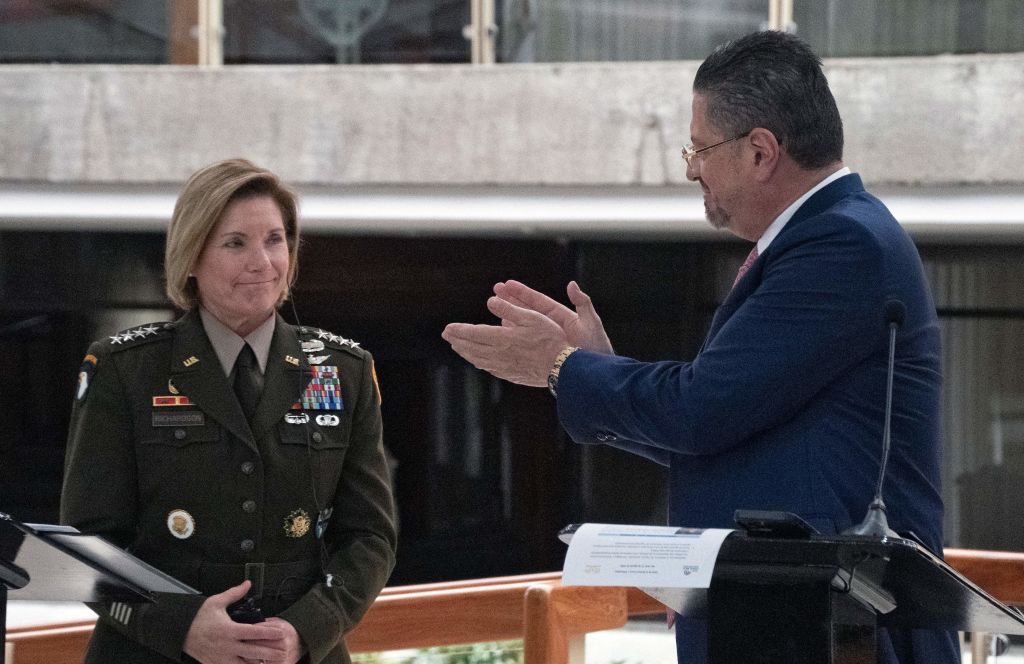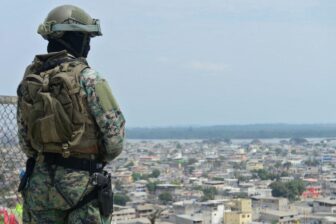BUENOS AIRES — Of late, the most visible U.S. official in Latin America and the Caribbean has arguably been General Laura Richardson, the head of the Miami-based Southern Command, known as SouthCom.
Since becoming the first woman to take the position in 2021, Richardson has been very active—including on issues outside the traditional military sphere. In Uruguay in February, Richardson met with defense and foreign ministry officials and donated 40 respiratory devices to strengthen the country’s disaster response capabilities. In Panama a month earlier, she participated in discussions on border security, cybersecurity, and other subjects.
Other recent trips saw Richardson in Colombia to discuss the security partnership with President Gustavo Petro, in Argentina, to meet then-Vice President Cristina Fernández, and then, in a separate trip to the south, discuss plans for a possible logistical pole in Tierra del Fuego. SouthCom has donated oral rehydration packets to Haiti, furniture and medicine to El Salvador, as well as field hospitals in Costa Rica. In her public comments, Richardson has emphasized the need to deepen cooperation with the region and showed concern about China’s growing influence. She has also made clear that Latin America is important to the U.S. in part because of the need for natural resources, including lithium.
Richardson has been an able emissary. But it is still worth asking: If Washington is genuinely concerned about losing influence to Beijing in Latin America, why has it relegated so much of its relationship with the region to a military institution such as SouthCom?
In recent years, the U.S. civilian leadership has missed numerous opportunities to strengthen ties with Latin America, as Shannon O’Neil writes in her excellent analysis in Foreign Affairs. As O’Neil notes, 11 countries in the region signed up for the so-called Americas Partnership for Economic Prosperity, launched by the Biden administration in June 2022 as a forum for discussing supply chains, sustainability, anti-corruption, and other economic matters. However, 21 countries currently belong to the Chinese Belt and Road Initiative. Other metrics highlighting the loss of U.S. influence in the region abound.
Lack of engagement
It’s clear that Washington’s main deficit with Latin America and the Caribbean today is political and economic rather than military. However, President Joe Biden has only been to the region once during his term in office. Secretary of State Antony Blinken has traveled more frequently, including to Mexico (with which the U.S. has a unique trading relationship) and Rio de Janeiro in February as part of the G-20 group, which Brazil currently presides. But in virtually every capital around the region, you hear the same refrain: There has been a lack of U.S. political and diplomatic engagement with the Western Hemisphere in recent years.
Given that reality, SouthCom seems to be trying to fill the gap. Indeed, SouthCom’s strategy for 2017-2027 states that it will partner with civil society, the academic sector, the private sector, and other organizations to improve governance and community resilience while broadening social and economic opportunities to help vulnerable populations. It also emphasizes the need to resist corruption, illicit networks, and perverse external actors. Significantly, the document clearly states that Russia and China are a threat to political stability in the region. Russia weakens political stability through extensive disinformation campaigns. The document also points out the significance of transnational criminal operations that create a political and economic context that Moscow and Beijing can exploit.
The Humanitarian Assistance Program of SouthCom is prepared to give aid in case of natural disasters. It can set up emergency operation centers, shelters, and schools. It is also prepared to support the development of civilian infrastructure necessary for economic and social reforms and improve the living conditions of impoverished regions.
The reasons why many of these programs are in the hands of the Armed Forces are unclear. Paradoxically, many of the activities carried out by SouthCom in Central or South America cannot be done by the military in the U.S. due to the limitations of the Posse Comitatus Act, the federal law of 1878, updated in 2021, which limits the powers of the federal government in the use of federal military personnel to enforce domestic policies within the United States. This juxtaposition is not lost on the civilian leaders in much of Latin America.
The reliance upon military interlocutors makes even less sense given the Biden administration’s expressed concerns about democratic backsliding in parts of Latin America. At a time when militaries are once again gaining political influence in some countries, it makes even less sense for a uniformed soldier to be the main emissary to the region.
There is an additional paradox: For 20 years, a narcotics-focused vision of the region has prevailed. Several U.S. government departments even speak of narcoterrorism as the central problem in Latin America. SouthCom has occasionally intervened in support of these initiatives. However, the command seems to be more dedicated to social policies and contacts with the highest political spheres in Latin America.
There’s no doubt that security is extremely important for all countries. However, this is not the only issue in Latin America. A more explicit and manifest umbrella that includes SouthCom but has more energetic and public participation from other parts of the U.S. government would help advance the interests of Washington and—most critically—the citizens of the region. Ultimately, SouthCom sometimes seems like the only public institution with permanent ties with the Western Hemisphere, meaning that the political relationship between the U.S. and its southern neighbors is in the military’s hands.
—
Tedesco is a Saint Louis University political science faculty member who specializes in Latin American politics, development, democracy, human rights, and the monitoring of political leadership.
Diamint works at Universidad Torcuato Di Tella and CONICET. She’s an expert in security issues, democracy, and civil-military relations.









